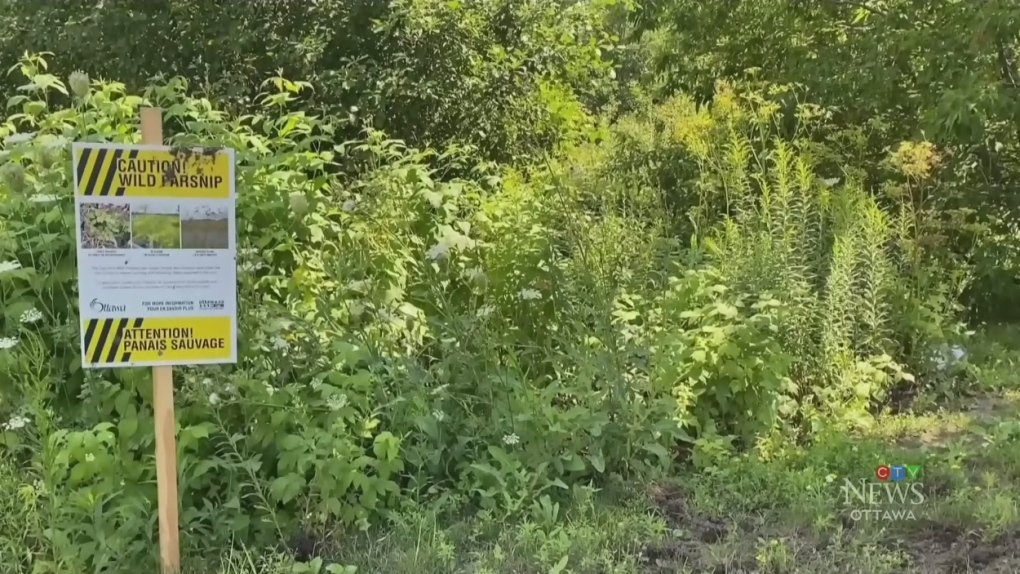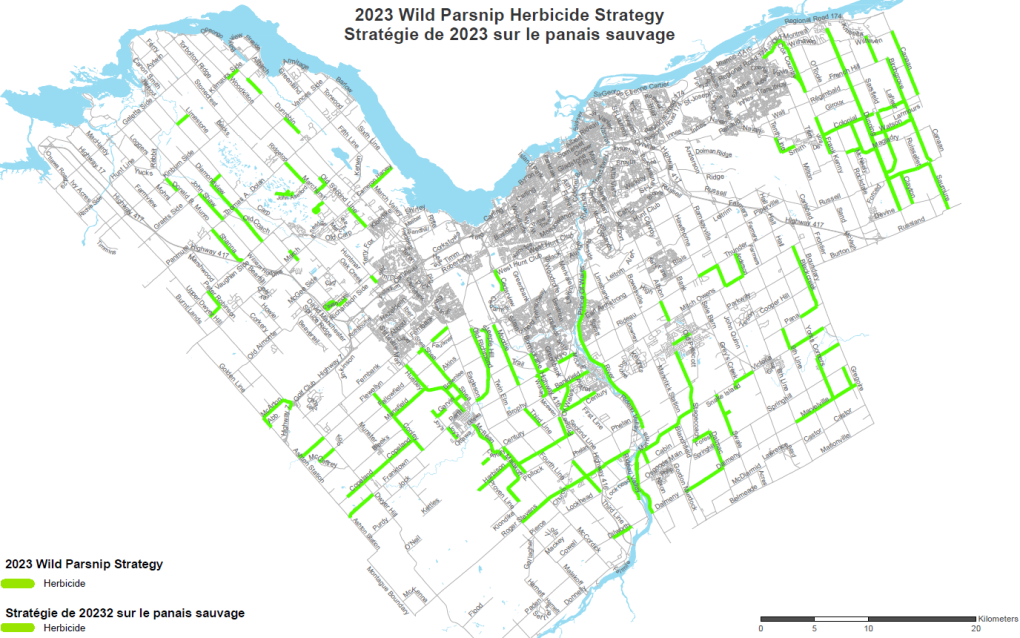Ottawa to begin spraying and mowing wild parsnip in suburban and rural areas

The city of Ottawa will begin spraying and mowing roadsides, pathways and parks this week to deal with wild parsnip, the invasive plant that can cause skin and eye irritation and make the skin prone to burning and blistering.
Approximately 650 lane kilometres of roadsides and pathways and over 200 park locations in suburban and rural areas will be treated with herbicides and mowed over the next few weeks and months.
"The goal is to reduce the growth of wild parsnip in highly infested areas while ensuring that environmentally sensitive areas and public safety are not adversely impacted," Allison Wilson, manager of technical operations with Public Works, said in a memo to Council.
In addition to the application of herbicides in highly infected areas, staff will continue, "mowing operations, adjusting frequency and timing to best coincide with herbicide applications."
Wilson says a "Notice of Herbicide Use" advertisement will appear in local newspapers one week prior to the start of spraying in public locations. Signs will also be posted every 100 metres along pathways and parks.
The Wild Parsnip Program will begin on Monday, with spraying in city parks to begin on June 6, weather permitting. Roadside grass cutting will also begin in early June.
The city will spend $298,000 to deal with wild parsnip this spring and summer.
Wild parsnip has been identified as a noxious weed in Ontario since Jan. 1, 2015.
Rural property owners can ask the city not to spray the areas adjacent to their property.
"Should a resident opt-out of the program, it will become their responsibility to manage any wild parsnip infestation adjacent to their property, as required by the Weed Control Act, 1990," Wilson says.
 The city of Ottawa released a map outlining where herbicides will be sprayed along roadsides/pathways and parkland to deal with wild parsnip. (City of Ottawa/memo)
The city of Ottawa released a map outlining where herbicides will be sprayed along roadsides/pathways and parkland to deal with wild parsnip. (City of Ottawa/memo)
Identifying wild parsnip
Wild parsnip is a highly branched plant, with hollow green stems, according to the city of Ottawa's website.
"It has two growth stages: non-flowering leafy rosettes at ground level and 0.5 to 1.5 metre-tall flowering plants."
The city outlines the stages of growth for wild parsnip on its website:
- Early growth: In the first year of growth, low-growing non-flowering rosettes of leaves form with a cluster of spindly, compound leaves that resemble celery leaves.
- In bloom: When wild parsnip is in bloom, usually in the second and third-year plants have tall, branched yellow flowering stalks that usually bloom in early June to late July.
- Mature plant: Starting in August the blooming plant will begin to turn brown and the leaves and stems will begin to dry up. This means that the toxic sap from the plant will also begin to dry up, and contact with the plant is less likely to cause a reaction.
How to avoid the plant
The city of Ottawa offers the following tips to avoid wild parsnip on pathways and in parks:
- It is recommended that the public stay on the groomed areas of parks, roadsides and pathways where there are less instances of wild parsnip.
- When working around wild parsnip or when walking through dense vegetation, wear goggles, gloves, long pants and long-sleeved shirts.
- Children should be reminded not to pick wild flowers
- If you are exposed to the plant sap, wash the contaminated area(s) thoroughly as soon as possible, and seek medical attention if skin irritation occurs
CTVNews.ca Top Stories

B.C. seeks ban on public drug use, dialing back decriminalization
The B.C. NDP has asked the federal government to recriminalize public drug use, marking a major shift in the province's approach to addressing the deadly overdose crisis.
More than 115 cases of eye damage reported in Ontario after solar eclipse
More than 115 people who viewed the solar eclipse in Ontario earlier this month experienced eye damage after the event, according to eye doctors in the province.
Orca calf that was trapped in B.C. lagoon for weeks swims free
An orca whale calf that has been stranded in a B.C. lagoon for weeks after her pregnant mother died swam out on her own early Friday morning.
Last letters of pioneering climber who died on Everest reveal dark side of mountaineering
George Mallory is renowned for being one of the first British mountaineers to attempt to scale the dizzying heights of Mount Everest during the 1920s. Nearly a century later, newly digitized letters shed light on Mallory’s hopes and fears about ascending Everest.
Sophie Gregoire Trudeau on navigating post-political life, co-parenting and freedom
Sophie Gregoire Trudeau says there is 'still so much love' between her and Prime Minister Justin Trudeau, as they navigate their post-separation relationship co-parenting their three children.
'I was scared': Ontario man's car repossessed after missing two repair loan payments
An Ontario man who took out a loan to pay for auto repairs said his car was repossessed after he missed two payments.
Trump's lawyers try to discredit testimony of prosecution's first witness in hush money trial
Donald Trump's defence team attacked the credibility Friday of the prosecution's first witness in his hush money case, seeking to discredit testimony detailing a scheme between Trump and a tabloid to bury negative stories to protect the Republican's 2016 presidential campaign.
U.S. flight attendant indicted in attempt to record teen girl in airplane bathroom
An American Airlines flight attendant was indicted Thursday after authorities said he tried to secretly record video of a 14-year-old girl using an airplane bathroom last September.
Powerful tornado tears across Nebraska, weather service warns of 'catastrophic' damage
Devastating tornadoes tore across parts of eastern Nebraska and northeast Texas Friday as a multi-day severe thunderstorm event ramped up in the central United States.






























